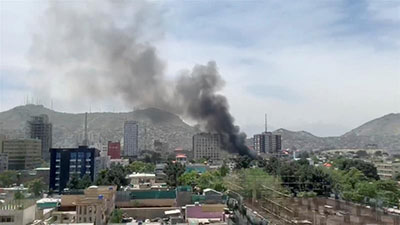by Farid Behbud
KABUL, June 5 (Xinhua) -- Armed clashes between Afghan security forces and Taliban militants as well as attacks had claimed numerous lives and injured dozens during Ramadan, the Muslim holy fasting month.
In Afghanistan, Ramadan began on May 6 and ended on June 3, during which, Taliban militants and Islamic States (IS) fighters have carried out series of deadly operations in different parts of the country and national capital Kabul.
On Monday, the last day of Ramadan, five civilians were killed and 10 others sustained injuries as a roadside bomb blast targeted a mini-bus in the western edge of Kabul city.
The targeted mini-bus, carrying the employees of Independent Commission for Administrative Reform, caught fire and victimized all people aboard the vehicle.

Taliban attack Counterpart office in heart of Kabul on May 8, 2019. (Photo: Xinhua)
Afghans from all walks of life have strongly condemned the terrorist attacks in the holy month of Ramadan, during which the faithful people observe the fast from dawn to dusk.
Before Ramadan, Afghan President Ashraf Ghani, Afghan religious scholars and Afghans from all walks of life called upon anti-government militants to halt hostilities or at least observe ceasefire during the Ramadan.
However, Taliban militants rejected the call and vowed to intensify activities against government interests.
Zabiullah Mujahid, a purported Taliban spokesman, has described Ramadan as the month of "Jihad and victory" calling upon Taliban fighters to speed up operations throughout the holy month.
On Sunday, two civilians were killed and 24 people including five police officers and two journalists were wounded, following three back-to-back bomb blasts in western Kabul for which the IS claimed responsibility.
Several female students of two universities were among the injured as the first blast targeted a bus carrying students.
The incident came two days after a deadly Taliban suicide car bombing against a U.S. military convey claimed lives of four civilians and injured seven others in Pul-e-Charkhi neighborhood in eastern Kabul.
Those among the injured were four U.S. soldiers.
On May 30, an IS suicide bomber detonated his suicide jacket outside a military academy in western Kabul, killing six people and injuring six others.
Several other civilians, including a female official, two religious scholars and more than 10 police officers, were killed and nearly 40 people wounded in separate attacks in Kabul during the month.
In one attack on May 8, nine people, including four civilians were killed, and 20 people wounded after Taliban launched a suicide car bomb explosion and ensuing shooting attack against a U.S.-funded aid group in central Kabul. The explosion caused a massive destruction in the area.
"Ramadan is traditionally and religiously the month of peace and unity among the faithful Muslims but the situation in Afghanistan seems different as militants claimed the lives of innocent civilians and several soldiers throughout the holy month across the country," Kabul resident Farhad Hazrati told Xinhua on Wednesday.
Hazrati said that he was optimistic that the government and militants may reach a ceasefire during three days of Eid al-Fitr starting from Tuesday which marks the end of Ramadan.
"We had a peaceful Eid festival last year when the government and the Taliban observed ceasefire during Eid al-Fitr but this year the two sides failed to conduct a ceasefire. The government announced to release several hundreds of Taliban from prison after Eid but the Taliban respond it with attacks," he said.
Expressing his hatred for terrorist attacks performed in the name of Islam, Hazrati said, "Even the militants directly attacked mosques and worshipers. Two persons, including a praying leader, were killed and many others wounded in two separate attacks on mosques in Kabul and Nangarhar province within the month of Ramadan. It is a shameful act. Attacking mosques and worshipers is a shameful act and it is an act against Islamic teachings."
"I don't like to follow a religion that allows the killing of innocent civilians, especially the worshippers inside mosques," he added.
Hundreds of soldiers and militants were also killed as clashes between security forces and Taliban have been continuing in more than 20 out of the country’s 34 provinces.
On June 1, eight police officers were killed and nine others wounded after a Taliban suicide bomber rammed an explosive-laden hijacked military vehicle into a police station in Ghazni city, capital of eastern Ghazni province.
On May 22, two police officers were killed and 15 civilians and police wounded after a hijacked military vehicle was detonated on outskirts of Ghazni city.
More than 25 people, including 11 children, were killed following landmine and roadside bomb explosions in the country during the period.
Militants also launched deadly attacks against security checkpoint and government forces’ defense posts, leading to bloody clashes in remote provinces of the mountainous country during the past one month.
The Afghan National Defense and Security Forces remain in control of most of Afghanistan’s population centers and all of 34 provincial capitals, but Taliban insurgents control large portions of rural areas, staging coordinated large-scale attacks against Afghan cities and districts since early April when the militant group launched a yearly rebel offensive.



